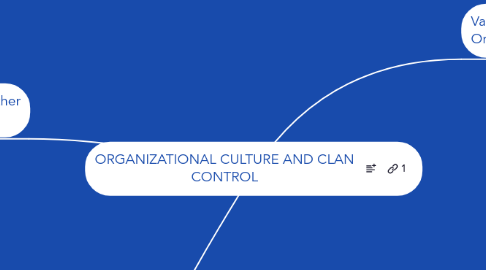
1. Organizational culture is another control system
1.1. Organizational culture
1.1.1. is the set of values, norms, standards of behavior, and common expectations that control the ways in which individuals and groups in an organization interact with each other and work to achieve organizational goals
1.2. Clan control
1.2.1. is the control exerted on individuals and groups in an organization by shared values, norms, standards of behavior, and expectations.
1.3. internalize organizational values and norms.
1.3.1. Organizational culture is not an externally imposed system; rather, employees
1.4. Organizational culture is an important source of control
1.4.1. It makes control possible in situations where managers cannot use output or behavior control.
1.4.2. When a strong and cohesive set of organizational values and norms is in place, employees focus on thinking about what is best for the organization in the long run
1.4.3. Employees of some organizations go out of their way to help their organization because the organization has a strong and cohesive organizational culture.
2. Culture and Managerial Action
2.1. Planning
2.2. Organizing
2.3. Leading
2.4. Controlling
3. Values and Norms: Creation a Strong Organizational Culture
3.1. Key Concepts
3.1.1. are beliefs and ideas about the kinds of goals members of a society should pursue and the kinds of behavior they should use to achieve these goals.
3.1.2. Norms are unwritten rules or guidelines that prescribe appropriate behavior in particular situations.
3.1.3. Norms emerge from values. How does this relate in your organization?
3.1.4. Values and norms inform organizational members about what goals they should pursue and how they should behave to reach those goals.
3.1.5. Managers can influence the kinds of values and norms that develop
3.2. Values of the Founder
3.2.1. An organization’s founder and his or her personal values and beliefs have a substantial influence on the values, norms, and standards of behavior within the organization
3.2.2. Founders select managers who share their vision of the organization’s goals
3.2.3. Subordinates imitate the style of the founder and transmit his or her values and norms to their subordinates
3.3. Socialization
3.3.1. Organizational members learn from each other which values are important and the norms that specify appropriate behaviors.
3.3.2. Organizational socialization is the process by which newcomers learn an organization’s values and norms and acquire the work behaviors necessary to perform effectively
3.3.3. Most organizations have some kind of socialization program to help new employees “learn the ropes.”
3.4. Ceremonies and Rites
3.4.1. Managers can create or influence an organizational culture by developing organizational ceremonies and rites
3.4.2. Rites of passage determine how individuals enter, advance within, or leave the organization.
3.4.3. Rites of enhancement let organizations publicly recognize and reward employees’ contributions
3.5. Stories and Language
3.5.1. Stories (whether fact or fiction) about organizational heroes and villains provide important clues about values and norms.
3.5.2. The concept of organizational language encompasses not only spoken language, but also nonverbal language, such as how people dress or the degree of formality used
